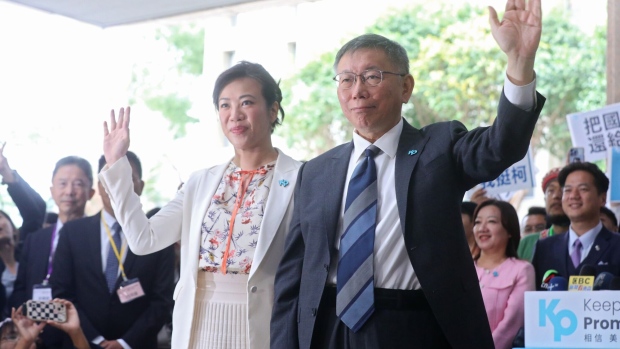Nov 23, 2023
Taiwan’s Hou, Ko Pick Running Mates as Alliance Talks Collapse
, Bloomberg News

(Bloomberg) -- Taiwan’s main opposition parties launched rival bids for the presidency after the dramatic implosion of a potential alliance that aimed to unseat the ruling party and install a China-friendly government.
The Kuomintang’s Hou Yu-ih named TV presenter Jaw Shaw-kong as his vice presidential running mate Friday morning, and filed formal papers to run in the Jan. 13 election. The Taiwan People’s Party’s Ko Wen-je also filed, selecting lawmaker Wu Hsin-ying as his running mate.
Terry Gou, the billionaire founder of Foxconn Technology Group, withdrew from the race, ending — for now — his years-long pursuit of Taiwan’s most-powerful job. His pitch to act as a key intermediary between Washington and Beijing failed to excite voters.
The breakdown of alliance talks boosts the chances of a victory for the ruling Democratic Progressive Party’s candidate, Vice President Lai Ching-te. Earlier this week, Lai — who has topped polls for much of this year — named Hsiao Bi-khim, the island’s former envoy to the US as his running mate, a sign he aims to bolster ties with Washington if elected.
A Lai win would be “very unwelcome” by Beijing, said Jonathan Sullivan, an associate professor at the University of Nottingham.
“There is zero chance that the unhappy trajectory in cross-strait relations gets reversed if Lai wins,” he added. “It will certainly lead to a continuation and probable escalation of pressures and threats.”
Taiwan’s presidential election will not only shape cross-strait relations for decades, but will impact the nature of the US’s already tense ties with China. Then US House Speaker Nancy Pelosi’s decision to visit Taipei last year led to a freeze in communication lines, including military talks, between the two superpowers.
US President Joe Biden’s repeated pledges to defend Taiwan in the event of a Chinese invasion have angered Beijing, which claims the island as its own territory. The Communist Party has accused the White House of changing its position on democratically ruled Taiwan, after decades of strategic ambiguity.
China respects Taiwan’s current election system and hopes its new leader will help bring ties with the mainland to the right path of peaceful development, China’s Taiwan affairs office said in a statement late Friday, according to China Central Television.
Mud-Slinging
The rival filings by opposition parties follows their spectacular public falling out at a press conference on Thursday, where Ko and Gou traded barbs with Hou on live television. Gou had been attempting to act as a broker between the others.
That effectively ended days of on-and-off negotiations over how both parties, which favor greater dialogue with China, would run a joint campaign to take on the ruling DPP. The 90-minute spectacle was a major departure from Taiwan’s normally staid presidential politics, and analysts said the farcical performance could have dented their credibility with voters.
“I have never seen something like this in the 20 plus years of Taiwanese politics,” said Niu Tse-hsun, a professor at the Chinese Culture University, who specializes in political science and political communication. “These political leaders’ mishandling of such a crucial agenda would cause them a big loss of supporters.”
Gou’s decision came less than four hours before the deadline to register his candidacy, transforming the contest into a three-way race.
“I choose to sacrifice myself for the greater good. This is my utmost dedication to my homeland,” Gou said in a statement.
Markets were little moved. The benchmark Taiex fell to session lows following news of the collapse in the opposition alliance, dropping as much as 0.2%, dragged down by chip stocks including Taiwan Semiconductor Manufacturing Co. It was earlier higher by a similar magnitude.
Now, with more than seven weeks to go before the election in January, the opposition candidates are hoping their choice of running mate will boost their prospects.
“One of the reasons for choosing Wu is that she complements me very well,” said former surgeon Ko at a press conference. “Having lived in the US and UK, her educational background, it’s very different from me, who was born in and only ever lived in Taiwan.”
--With assistance from Ishika Mookerjee, Jeanny Yu, Evelyn Yu and Li Liu.
(Adds China’s response in the ninth paragraph.)
©2023 Bloomberg L.P.





